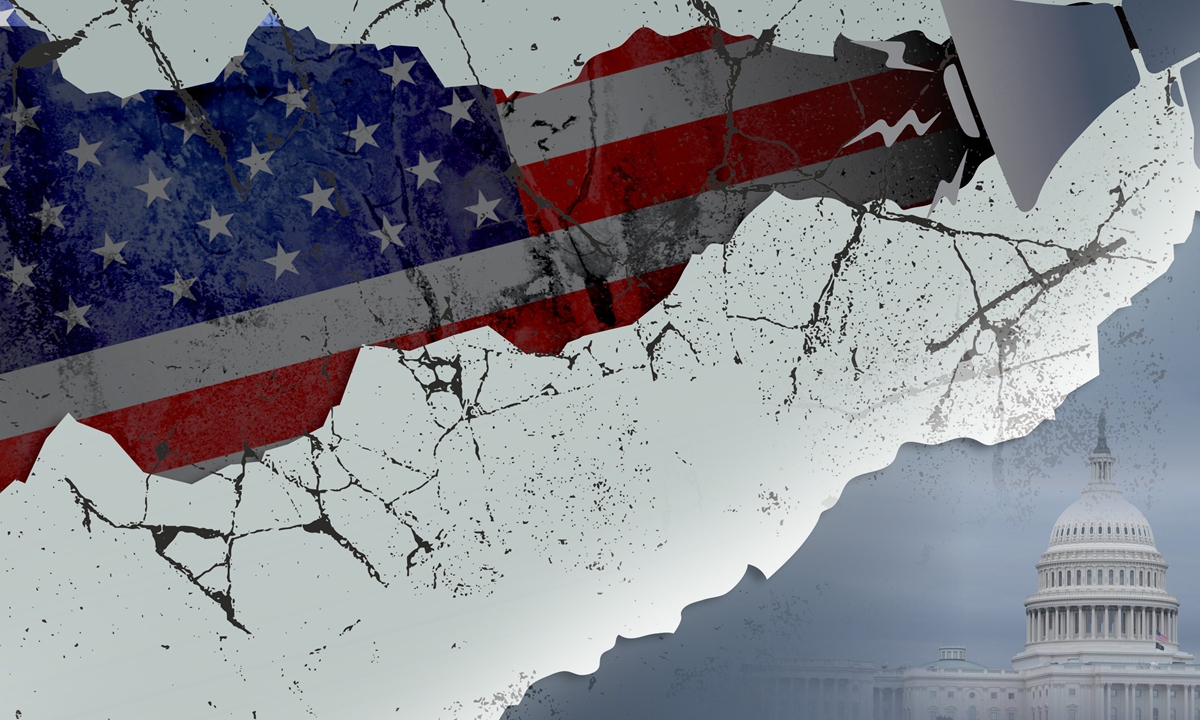
Photos: VCG
The world is undergoing unprecedented changes unseen in a century. The crisis in Ukraine continues. A trend toward reconciliation emerges in the Middle East. Calls for Europe's strategic autonomy are rising. In the midst of these changes, some strange phenomena are also surfacing, among which, the frequent occurrence of anti-China syndrome in the US-led Western world - opposing whatever China does - is the most absurd.To serve their anti-China purpose, some American and Western politicians, media outlets and scholars have made quite a few astonishing arguments. Take a recent example. Gordon Chang, infamous for his "China collapse" theory, said in a recent TV show that blood-drinking Chinese soldiers secretly invaded US for upcoming attack. After the show, even some foreign netizens called him insane.
Relevant phenomena are laughable, but they are also worth pondering. The anti-China syndrome exposes the decline of American hegemony and the shortcomings of American-style democracy. It not only damages China-US relations but also tramples on human conscience and undermines the international order, becoming a "tumor" eroding normal international relations.
US anti-intellectual politicians
In order to smear China, some American politicians have completely become anti-intellectual. They go against historical common sense, confuse technical concepts, fabricate imaginary scenarios, and come up with all sorts of ridiculous and ugly behaviors.
For example, the Governor of South Dakota, Kristi Noem, said in March that China has a 2,000-year plan to destroy the US. The nonsensical remarks made US netizens laugh, "Wait, how far back does US history go? Less than 250 years?"
Also in March, North Carolina Republican Richard Hudson asked TikTok CEO Shou Zi Chew who took the stand in front of Congress, "Does TikTok access the home WiFi network?" The question was later imitated and ridiculed by netizens around the world. Many young Americans disappointedly asked: "Why should a group of old stubborn people who don't even understand basic technical principles decide the fate of our country?"
So the question arises: Even ordinary netizens can see the absurdity in their remarks, don't these political "elites" know it themselves? In order to spread rumors and smear, they are willing to give up their dignity, then what do they want? The answer is simple. They talk about ideology, but what they really want is personal gain.
They spout nonsense and fabricate stories in order to create a tough image toward China to gain popularity in politics and attract votes. By doing so, they can cater to anti-China sugar daddies and receive additional political donations. It's a win-win situation. These American "elites" have a calculating mind.
Deep-rooted institutional woes
The more excitedly the US behaves, showing its anti-China syndrome, the more their own deep-rooted institutional problems are exposed.
The US is showing increasingly severe anti-China syndrome because it needs to cover up internal crises. In recent years, the US has been trapped in a vicious cycle of distorted democracy, political dysfunction, and social disharmony. Political infighting and money politics have greatly reduced the country's governance capacity. Long-standing issues such as racial discrimination and gun violence remain unresolved, and the American people are increasingly disappointed with their country. In order to cover up these deep-rooted problems, Washington has deliberately created an external imaginary enemy by exaggerating the "China threat," attempting to divert public dissatisfaction.
Also, the US is anxious about its declining hegemony. Since the end of World War II, the US has become the world's No.1 power. And for more than 70 years, the US had stood as a shining city on the hill and the "beacon of democracy." It has been accustomed to dictating terms and dealing with other countries from its position of strength. However, with the rise of emerging countries such as China, the international landscape has witnessed a significant shift of the center of gravity from the West to the East, and the US' anxiety to maintain its hegemony has grown day by day.
Some American politicians have fallen into the delusion of being "persecuted by China" and have started to come up with twisted ideas of erecting walls or barriers, decoupling or disrupting supply chains. Whenever they feel that they can't win, they start using dirty tricks. They are like the "school bullies," who, when they can't learn themselves, would start causing trouble and preventing others from learning.
Worse, unscrupulous media outlets have been fanning the flames of anti-China hype. They have gone so far that some insightful international figures slapped them in the face. When responding to an Australian journalist's question, "What makes you so sure China isn't a military threat to Australia?" Former Australian prime minister Paul Keating replied, "Because I've got a brain, principally, and I can think."
Self-inflicted harm
Anti-China syndrome is absurd and harmful. If Washington does not let go of its obsession with anti-China sentiment, it will ultimately harm itself.
Currently, China-US relations are at their lowest ebb since the establishment of diplomatic ties, and mutual trust is being tested. The root cause of this situation lies in the US' erroneous understanding of China, leading to the formulation and implementation of misguided policies toward China.
And it makes no sense when the US says to set up guardrails for ties while at the same time undermining the political foundation of the bilateral relationship; or says not to contain China on one hand and then impose sanctions on Chinese companies on the other. Such actions will only push China-US relations toward a dangerous conflict and confrontation.
The US has set a bad example for the world - arbitrarily imposing sanctions under the excuse of national security. Thanks to US' influence, supply chains and industrial chains are increasingly being politicized and weaponized, posing risks to the global economic system.
The anti-China syndrome cannot solve the problems currently faced by the US, but will fuel anti-intellectualism. If policy choices are often held hostage by ideology, and national governance often fails to proceed from rationality and facts, ultimately, the trend will cause self-inflicted harm.
Emerging multipolarity
More and more people are recognizing the harm mentioned above. Voices of justice and reflection are constantly emerging. Ian Bremmer, president of Eurasia Group and GZERO Media, said "there are virtually no US allies that are really all-in on the idea of a 'cold war' with China." French President Emmanuel Macron has said Europe must not be a "follower" of the US agenda when it comes to the Taiwan question. In the eyes of former Singaporean diplomat Kishore Mahbubani, American dominance in international affairs may well be coming to an end, and the world will see the return of Asia.
Positive energy on global scale is emerging. Iran and Saudi Arabia, longtime regional rivals, have resumed diplomatic relations and agreed to reopen their embassies after Chinese-led negotiations in Beijing. It has become an important example for countries around the world to resolve conflicts through dialogue and consultation, and has won widespread praise from the international community.
This year, a growing number of foreign leaders have visited China, and China's diplomacy has achieved fruitful results. Various countries have expressed their clear opposition to confrontational camps, demonstrating that openness and cooperation are still the trend of history and win-win cooperation is still the aspiration of the people.
Good news on the China-proposed Belt and Road Initiative is also emerging. Montenegro has welcomed its first highway. Sri Lankan residents now have access to 24-hour water supply, and Cambodian villagers have bid farewell to a life without electricity, roads, and isolation from the outside world. More and more countries and regions are seizing development opportunities through this initiative and sharing development with China.
In today's world, the historical trend of peace, development, cooperation, and win-win outcomes is unstoppable. The trend of multipolarity, economic globalization, and democratization of international relations is irreversible. History has repeatedly proven that those who go against the tide of the times are destined to fail. The farce of the US and its followers' anti-China syndrome is destined to be kicked off the stage of history in the face of the tide of the times and popular sentiment.
The author is a reporter with People's Daily Overseas Edition. opinion@globaltimes.com.cn

